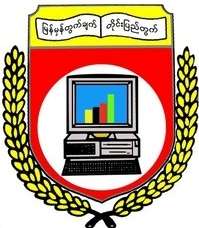University of Computer Studies, Yangon
The University of Computer Studies, Yangon (UCSY) (Burmese: ရန်ကုန်ကွန်ပျူတာတက္ကသိုလ် [jàɰ̃ɡòʊɰ̃ kʊ̀ɰ̃pjùtà tɛʔkəθò]), located in the outskirts of Yangon (Hlaw Gar), is the leading IT and computer science university of Myanmar.[1] The university, administered by the Ministry of Education, offers undergraduate and graduate degree programs in computer science and technology. The language of instruction at UCSY is English. Along with the University of Computer Studies, Mandalay, UCSY is one of two premier universities specializing in computer studies, and also one of the most selective universities in the country.
ရန်ကုန်ကွန်ပျူတာတက္ကသိုလ် | |
| Motto | မြန်မှန်တွက်ချက် တိုင်းပြည်တွက် |
|---|---|
| Type | Public |
| Established | 1987 |
| Rector | Dr. Mie Mie Thet Thwin |
| First Rector | Dr. Tin Maung |
| Location | , |
| Colors | Turquoise |
| Affiliations | SOI Asia, MOE-ST |
| Website | www |
 | |
Many of the country's middle and upper level personnel in government and industry are graduates of UCSY.[2]
History
UCSY's origins trace back to the founding of the Universities' Computer Center (UCC) in 1971 at the Hlaing Campus of Yangon University. Dr. Chit Swe founded UCC (Universities’ Computer Center) with the help of U Soe Paing, U Myo Min and U Ko Ko Lay.
Dr. Chit Swe was a prime mover and a proponent of technology transfer, leapfrogging technology and lifelong learning.
Dr. Chit Swe was a native of Pyinmana, Mandalay Division, and had attended Mandalay University. He studied mathematics at the University of London and got his Ph.D from the University of Liverpool.
Dr. Chit Swe served as professor of mathematics in Rangoon Arts and Science University (RASU)in 1967, director of Universities Computer Centre (UCC) and rector of RASU.
Dr. Chit Swe taught at ABAC, Thailand before migrating to Australia. He supervised the dissertation of several Burmese (Myanmar) students in Thailand and Australia. He died on November 21, 2019, in Sydney, Australia.
U Hla Min was a member of several of Dr. Chit Swe's projects. He has written several articles (e.g. Memories of UCC) in Facebook pages and his personal website hlamin.com
Equipped with ICL [[ICL 1902S] and with the help of distinguished visiting professors from USA, UK and Europe, UCC provided computer education and training to university and government employees.[3] In 1973, it began offering a master's degree program (MSc in Computer Science), and a graduate diploma program (Diploma in Automated Computing) in cooperation with the Mathematics Department of Yangon University.[4] The center added DEC PDP-11/70 mini-computers in 1983, and personal computers in 1990. In 1986, the center added B.C.Sc (Bachelor of Computer Science) and B.C.Tech (Bachelor of Computer Technology) degree programs.[3]
In March 1988, the Institute of Computer Science and Technology (ICST) was established, and began offering bachelor's degree programs in Computer Science. In 1993, it started an internationally accepted International Diploma in Computer Studies (IDCS) program with the help of UK's the National Computing Centre (NCC). On 1 January 1997, the university's control was transferred from the Ministry of Education to the Ministry Science and Technology.[3] On 1 July 1998, it was renamed the University of Computer Studies, Yangon.[4] A graduate school with master's and PhD degree programs was established in May 2001.[2]
Programs
UCSY offers five-year bachelor's and two-year master's degree programs in computer science and computer technology. The school also offers a two-year post-graduate diploma and a three-year Ph.D. program in computer science and information technology.[4] The school's language of instruction is English.
| Program | Bachelor's | Master's | Doctorate |
|---|---|---|---|
| Computer Science |
B.C.Sc (Knowledge Engineering) B.C.Sc (Software Engineering) B.C.Sc (Cyber Security and Forensics) B.C.Sc (Business Information Systems) |
M.C.Sc (Knowledge Engineering)
M.C.Sc (Software Engineering) M.C.Sc (Cyber Security and Forensics) M.C.Sc (Business Information Systems) |
Ph.D. |
| Computer Technology | B.C.Tech (Embedded Systems)
B.C.Tech (Computer Communication and Networks) |
M.C.Tech (Embedded Systems)
M.C.Tech (Computer Communication and Networks) |
Ph.D. |
| Applied Science | None | M.A.Sc. | None |
| Information Science | None | M.I.Sc. | None |
Faculty
- Faculty of Computer Systems and Technologies
- Faculty of Computer Science
- Faculty of Information Science
- Faculty of Computing
Supporting departments
Research labs
- Natural Language Processing Lab
- Geographic Information System Lab
- Image Processing Lab
- Mobile and Wireless Computing Lab
- Embedded System Lab
- Cyber Security Research Lab
- Cisco Network Lab
- Cloud Computing Lab
- Artificial Intelligence Lab
- Computer Graphics and Visualization
- Database System Lab
- Software Engineering Lab
- Numerical Analysis Lab
- Operation Research Lab
- UCSY-Ishibashi Lab
Affiliations
Universities
Other universities
The following universities of computer studies are officially affiliated with UCSY.[4] Their qualified graduates can continue their advanced studies at UCSY.
- Computer University, Bamaw
- Computer University, Dawei
- Computer University, Hinthada
- Computer University, Kalay
- Computer University, Kyaingtong
- Computer University, Loikaw
- Computer University, Lashio
- University of Computer Studies (Maubin)
- Computer University, Magway
- Computer University, Thaton
- University of Computer Studies, Mandalay
- Computer University, Mandalay
- Computer University, Monywa
- Computer University, Myeik
- Computer University, Meiktila
- Computer University, Myitkyina
- Computer University, Pathein
- Computer University, Pakokku
- Computer University, Hpa-An
- Computer University, Pyay
- Computer University, Pinlon
- Computer University, Sittwe
- Computer University, Taungoo
- University of Computer Studies, Taunggyi
References
- "AI3 & SOI Asia Project Partner List" (PDF). School on Internet Asia. 2008-05-01. Retrieved 2008-11-30.
- "University of Computer Studies". Ministry of Science and Technology. 2007-05-27. Retrieved 2008-11-30.
- "Science and Technology". MODINS. Retrieved 2008-12-31.
- Dr. Sayne Lei Shwe. "Technology and State Development" (PDF). Ministry of Science and Technology. Retrieved 2008-09-13. Cite journal requires
|journal=(help) - Nyi Nyi Aung (2003-02-24). "Joint degree for PhD in computer studies". The Myanmar Times.
External links
- School site: Official website of UCSY